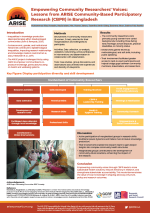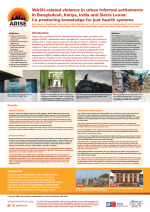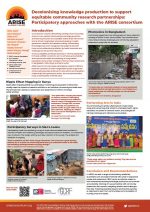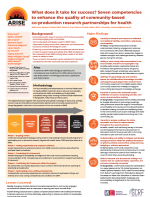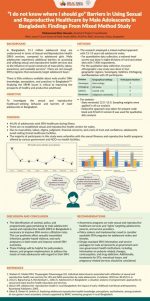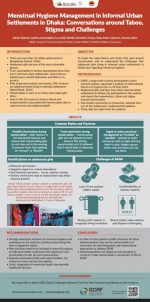This poster was originally presented at the 8th Annual Symposium on Health Systems Research in Nagasaki, Japan. Authors are Muhammad Riaz Hossain, Nazia Islam, Mst. Nusrat Jahan, Tasmiha Amin Oishy, Bachera Aktar and Sabina Faiz Rashid. Inequalities in knowledge production disproportionately affect disadvantaged communities (John & Rempala, 2024). Socioeconomic, gender, and institutional hierarchies contribute to […]
A poster, presented at Bintu Mansaray, Rosie Steege, Samira Sesay, Inviolata Njeri Njoroge, Ivy Chumo, Caroline Kabaria, Blessing Mberu, Partho Mukherjee, Surekha Garimella, Riaz Hossain, Sabina Rashid, Rachel Tolhurst, Neele Wiltgen Georgi, Kate Hawkins, Sally Theobald and Laura Dean, at the 8th Global Symposium on Health Systems Research. Urban informal settlements are characterised by poor […]
Co-production requires dismantling existing power hierarchies. As such, it can support decolonising knowledge generation and fostering inclusive and equitable relationships with diverse (and at times) marginalised actors participating in health governance, research and decision-making. Decolonising knowledge production recognises that expertise lies with those communities directly affected by health inequities and challenges as well as other […]
Decolonising health research requires a shift to inclusive processes, and actively engaging with communities. Community-based participatory research (CBPR) fosters collaboration among communities, researchers, and implementers to produce contextual knowledge for action. Enhancing co-production skills and competencies has been shown to improve research quality and validity, while CBPR principles have been developed, limited guidance exists on […]
“I do not know where I should go” Barriers in Using Sexual and Reproductive Healthcare by Male Adolescents in Bangladesh: Findings From Mixed Method Study This poster by Muhammad Riaz Hossain was presented at the National Adolescent Health Conference in Bangladesh. It was funded by the Embassy of the Kingdom of the Netherlands project titled ‘Understanding Sexual […]
Menstrual Hygiene Management in Informal Urban Settlements in Dhaka: Conversations around taboo, stigma and challenges This poster by Adrita Rahman was presented at the National Adolescent Health Conference in Bangladesh. The poster won first prize at this national event.
Authors: Farzana Manzoor, Wafa Alam, Imran Hossain, Nadia Farnaz, Bachera Aktar, Sabina Faiz Rashid Objective To explore different forms of social capital networks, exist in urban slums of Dhaka, Bangladesh and how these social capital networks were helpful during the pandemic. Method A cross-sectional study with a qualitative approach was conducted in three urban slums […]
Perception and attitudes towards COVID-19 vaccination among urban slum dwellers in Dhaka, Bangladesh
W. Alam, BRAC James P Grant School of Public Health, BRAC University, Dhaka, Bangladesh Background Vaccine hesitancy – ‘delay in acceptance or reluctance or refusal to vaccination despite the availability of vaccination services’ – It is identified as one of the ten major threats to global health in 2019 Bangladesh started its COVID-19 vaccination drive […]
N. Farnaz, F. Manzoor, W. Alam, B. Aktar, S. F. Rashid | BRAC James P Grant School of Public Health, BRAC University Dhaka, Bangladesh Background Community Health Workers (CHWs) bridge the gap between communities living in urban informal settlements and formal health systems 130,000 CHWs employed in Bangladesh – 50,000 by the government, 50,000 in […]
Bachera Aktar (bachera.aktar@bracu.ac.bd), BRAC James P Grant School of Public Health, BRAC University, Dhaka, Bangladesh; Liverpool School of Tropical Medicine, Liverpool, UK Background One-third of the population of Dhaka city, the capital of Bangladesh, live in slums (BBS, 2015) which are often left out of urban planning and development (Banks, 2011). There is a lack […]
